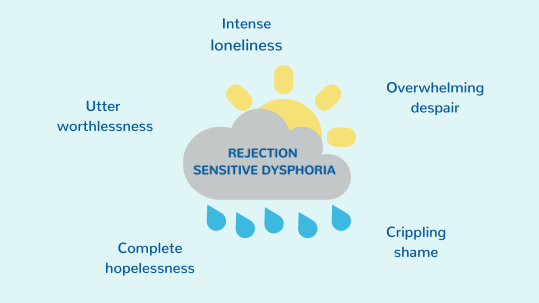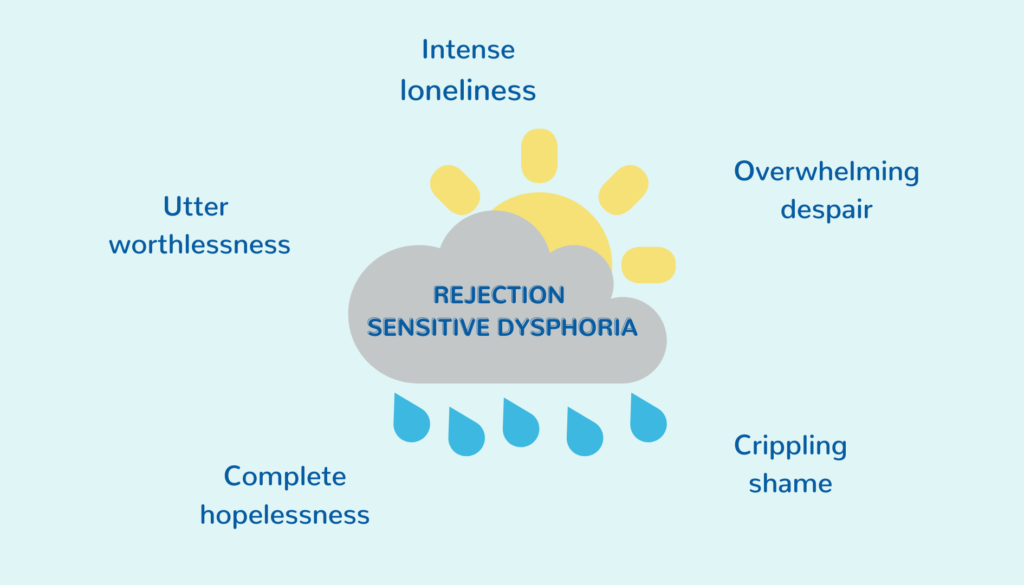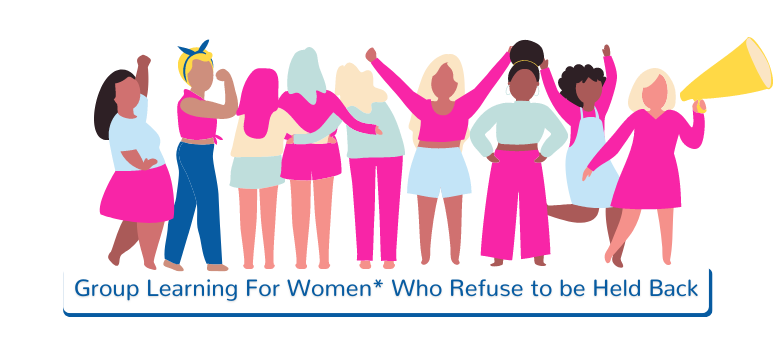
24 Oct Overcoming rejection sensitive dysphoria: My story of healing

Rejection sensitive dysphoria (RSD) is sh*t. I used to experience it all. the. freakin. time. But, amazingly, I almost never do anymore, aside from tiny, momentary remnants I can easily handle. This is something I’m so grateful for… If you want to find out how I did away with it, read on.
What is RSD?
I suspect you most likely don’t need an introduction to this term, but just in case, most people describe it as extreme sensitivity to criticism or perceived rejection. But honestly, in my experience, that’s putting it mildly.
For me, it was one of the most horrendous types of despair there is, characterized by overwhelming shame and the God-awful certainty that I was one of the biggest, most unlovable losers imaginable. The harshest self-talk on repeat was super common.
It was harrowing in a way no other emotion I’ve ever experienced has been. And it’s rife for those of us with ADHD.
RSD was so toxic it destroyed my ability to have beautiful relationships and left me with next to no self-worth for most of my life. It’s heartbreaking to think of all those years (close to 30!) that it had this power over me. Even though it’s a thing of the past, I will never forget that horrendous feeling.
It was so prominent that I never thought I’d have peace of mind. But I was wrong. (Even twelve years later I pinch myself that this is true!)
Does learning about ADHD with a fabulous group of women instead of going it alone sound good?
The Ultimate ADHD Reboot is a group learning experience for women* who refuse to be held back!
What can you learn from my experience?
If I can overcome it, so can you. I was sure I’d never escape those horrendous feelings, but something kept me searching for a different reality.
Lesson No. 2: Emotional pain can be a teacher.
It’s a cruel irony, but the pain I endured was what drove me to end up in such a great emotional place today.
If it weren’t for those dark days, I wouldn’t have been compelled to seek more. My journey into mindfulness took me to Plum Village, a Buddhist monastery founded by Zen Master Thích Nhất Hạnh in France. His teaching, “No mud, no lotus,” shows how suffering is integral to the path toward true contentment and compassion.
I’m living proof that inner turmoil can be the catalyst for cultivating awareness and compassion.
Lesson No. 3: Learning to be more present and compassionate was key to overcoming RSD.
As you might have gathered by now, learning to be more present and compassionate – especially toward myself – by practicing a ton of mindfulness was how I overcame RSD.
I immersed myself in mindfulness practices—retreats, meditating with binaural beats, yoga, reading, blogs, videos—you name it.
One easy way to access this wisdom is through the Insight Timer app/website. There are literally thousands of practices to try (I’ve even got some on there too, if you’re curious 😉).
What I love about learning to be mindful is that there are so many ways to do it—you don’t have to sit in a lotus position if that’s not your thing. Movement-based practices, like somatic therapies, Tai Chi, Qi Gong (my fave), martial arts, and yoga, can also teach present-moment awareness.
It’s all an experiment, and if you approach it with a curious, open mind, I’m supremely confident that, over time, you’ll be derailed less and less by the stories your upbringing and neurobiology have created. What have you got to lose?
Still, if this doesn’t resonate, I have another suggestion.
One last tool to consider
I’ve heard one ADHD expert say that ‘alpha-agonists’ (a type of ADHD medication) can be an effective treatment for RSD for many people with ADHD. While I haven’t found peer-reviewed studies confirming this, I’ve heard many say these meds (like clonidine) help with emotional regulation.
And a final thought—maybe let your imagination wander to a time where you no longer experience RSD—a place where you feel proud of who you are and worthy of all the goodness life has to offer.
As I’ve said, if I can be rid of RSD, there’s no reason you can’t, and I hope with all my heart that my story gives you faith that you can overcome it too. x


